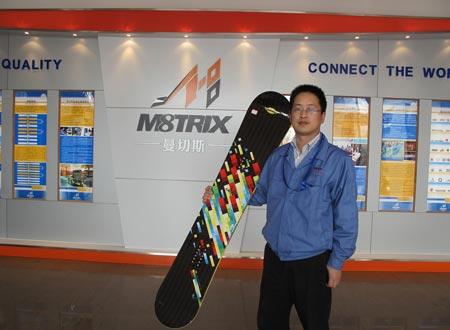
Matrix currently exports snowboards to more than 40 nations and regions. The company's low cost and high quality helped it weather the financial crisis last year while many others saw great drops in sales. Provided to China Daily
SHANGHAI - Watching the Winter Olympics from his home in Ningbo, Zhejiang province, Shi Dingwei was not only excited by the better-than-expected performance of the Chinese team, but also proud of the fact that snowboards used by the athletes from various countries were made in his workshop."We feel so proud of our products and all our hard work has paid off," said Shi, general manager of Ningbo Matrix Sportgoods Co Ltd.
Ningbo Matrix is a relative small enterprise in the industrial heartland of eastern China. But it is one of the leading makers of winter-sports equipment in the country. So far, the company has remained an OEM manufacturer of products designed and contracted by foreign customers.
"The snowboards (used in the Olympics) didn't have our own logo on them, but we could easily recognize them by the design patterns," Shi added.
The majority of SIMS-brand snowboards that the American team used were made by Ningbo Matrix, SIMS's major OEM manufacturer.
The US snowboard team won a total of two gold medals, one silver and two bronzes, outperforming any other national team during the just ended Winter Olympics.
Although only an original equipment manufacturer of its US partner, Matrix has enjoyed rapid development since it's founding a decade ago. The company currently exports snowboards to more than 40 nations and regions, including North America, Europe, Australia and Southeast Asia.
In 2000, the parent company of Matrix, which is a mould maker, received an order from the US for making a snowboard mould. After fulfilling the order, Shi, a graduate from Wuhan University of Hydraulic and Electrical Engineering, sensed a great opportunity.
"I feel the sports equipment will be a sunrise industry. In Xiangshan, there are a number of mould makers, and we have to diversify our businesses," Shi said.
Matrix's low cost and high quality helped it weather the financial crisis last year, while many other snowboard makers saw great drops in sales.
"We produced more than 100,000 snowboards in 2009, and realized a total of 50 million yuan in revenue, up 30 percent from 2008," Shi said.
However, Shi admitted their business was not immune to the world economic slowdown. "We expected 50 percent growth in 2009, but it slowed to 30 percent as more snowboard fans cut spending on the sport."
Being the world's largest producer, China does not have many snowboard fans, and nearly all of the 20 snowboard makers centered in Guangdong, Zhejiang, Jiangsu provinces are export oriented.
However, in Europe, Australia and North America, snowboards are popular winter gifts.
"Things are getting better. With the growing spending power of domestic sports fans, we will have more orders from China, and this will also help us popularize Matrix-branded snowboards," Shi said.
In 2004 two Australian companies, Force and Xetrov, co-invested $1.15 million in Matrix, thus becoming overseas shareholders.





